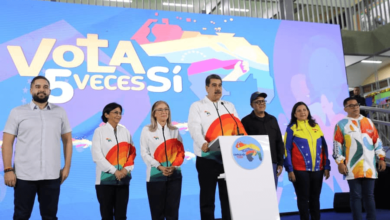Imperialist and proxy threats against the Venezuelan Revolution are mounting. Recently, Venezuelan President Hugo Chávez revealed knowledge of a U.S.-Colombia plan to destabilize Venezuela:
“I alert the world of the following,” said Chávez at the Bolivarian Alternative for the Americas (ALBA) summit on Jan. 26. “The U.S. empire is creating conditions to generate an armed conflict between Colombia and Venezuela.” He correctly noted that “Colombia is already taken over by the U.S. empire.”
In January 2008 alone Colombia was visited by a line of Washington’s political elite, including Secretary of State Condoleezza Rice; Admiral Michael Mullen, chairman of the Joint Chiefs of Staff; and “drug czar” John Walters.
Colombia has long been a U.S. outpost for the war against revolutionary currents in Latin America—dressed up as the phony “war on drugs”; now the “war on terror.” Its militaristic, hard-right president, Alvaro Uribe, is a neoliberal warrior-servant to Washington’s policy in the region. For Colombia’s trouble, the government gets rewarded with billion in military aid each year.
Much of this has gone toward attempting to defeat the multi-decade guerrilla insurgency of the Marxist-Leninist Revolutionary Armed Forces of Colombia (FARC) and National Liberation Army (ELN). But the Marxist guerrillas have continued, and the revolution has gained traction in recent years due to deepening roots of the Bolivarian Revolution in Venezuela.
Chávez’s orientation toward achieving a socialist revolution in Venezuela has strengthened the revolutionary forces in surrounding countries immeasurably, especially in neighboring Colombia. A regional revolutionary block against imperialism is beginning to take shape.
In early January, Chávez negotiated the release of two prisoners being held by the FARC. He did this directly with the FARC leadership, bypassing the intransigent Uribe regime at all levels. This bold move was a necessity. Uribe had thrown every possible obstacle at Chávez, sabotaging a prisoner swap with the FARC numerous times with ever-increasing hostility.
Chávez’s and the FARC’s joint success was a diplomatic victory against imperialism and its lackeys. It showed that revolutionary politics can solve protracted issues through alliance, and that Uribe and his handlers only want prolonged war and suffering for the Colombian masses.
Just days later, Chávez continued the offensive. In his State of the Union address, he called on the European Union to take the FARC and the ELN from its “terrorist” list. He noted that they were only placed on the list because of U.S. pressure, correctly calling the groups “real armies” that have a goal “we respect.”
These brief statements signal a highly important development in the Latin American working-class struggle for power. They demonstrate Venezuela’s acknowledgement of unity of purpose with the Marxist insurgents in Colombia. They share a Bolivarian project—Latin American unity against imperialism. They share a common goal—the socialist reorganization of society for the benefit of the workers and the oppressed.
All of this spells trouble for the imperialists in Washington. Chávez and his comrades in Cuba, Bolivia, Colombia and the rest of Latin America want to cast off the shackles of foreign domination in favor of independence and true solidarity. They do not wish to be part of Washington’s subjugated “backyard” any more.
But the United States is not sitting idly by while the revolutionary forces strengthen against their neo-colonial rule. Chávez’s comments at the ALBA summit did not come out of nowhere as the capitalist press would have us believe.
The garrison state of Colombia is being brandished as the launching pad for counterrevolution. And the threats are getting more urgent by the day.
Pretexts for destabilization or military intervention are flowing from the mouths of political hacks in Bogotá and Washington regularly. One such pretext is the false characterization of Venezuela as a “major facilitator” of Latin American drug trafficking. This canard is meant to link the FARC—always smeared by the imperialists as drug traffickers—and Venezuela in an unholy way. It is meant to obscure their just political and social positions and their recent political coup.
Similarly, the drug trafficking lie has evolved into feigned “fear” by Washington about weapons purchases by Venezuela. “They certainly are of great concern,” Joint Chiefs Chairman Mullen recently said, “not just to Colombia—which has been expressed to me—but to the region and in fact very much to the United States.”
The origin of these threats has nothing to do with drug trafficking. They come from the growing challenge posed by Venezuela to U.S. hegemony. Imperialism cannot allow its empire to be pushed back and potentially defeated in an area it has long controlled. The threats by imperialism are increasing in proportion to the strengthening of the Latin American revolution.
Colombia is not the only country at issue. ALBA—comprised of Venezuela, Cuba, Nicaragua and Bolivia—has just welcomed a new member, the small Caribbean island of Dominica (not the Dominican Republic). At the summit, Chávez not only discussed the plots of intervention against Venezuela, but the positive role of ALBA, as an alliance of like-minded nations determined to counter the “dictatorship of global capitalism.”
Building working-class solidarity with the Bolivarian Revolution in Venezuela and all forces struggling against imperialism in Latin America is paramount for revolutionaries in the United States at this time. We cannot wait for an imperialist intervention to be launched to take this message to our class, which has nothing to lose and much to gain by the forward march of Venezuela.






